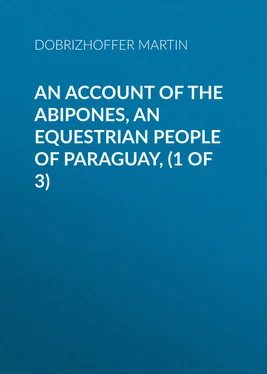Martin Dobrizhoffer - An Account of the Abipones, an Equestrian People of Paraguay, (1 of 3)
Здесь есть возможность читать онлайн «Martin Dobrizhoffer - An Account of the Abipones, an Equestrian People of Paraguay, (1 of 3)» — ознакомительный отрывок электронной книги совершенно бесплатно, а после прочтения отрывка купить полную версию. В некоторых случаях можно слушать аудио, скачать через торрент в формате fb2 и присутствует краткое содержание. Жанр: foreign_antique, foreign_prose, на английском языке. Описание произведения, (предисловие) а так же отзывы посетителей доступны на портале библиотеки ЛибКат.
- Название:An Account of the Abipones, an Equestrian People of Paraguay, (1 of 3)
- Автор:
- Жанр:
- Год:неизвестен
- ISBN:нет данных
- Рейтинг книги:3 / 5. Голосов: 1
-
Избранное:Добавить в избранное
- Отзывы:
-
Ваша оценка:
- 60
- 1
- 2
- 3
- 4
- 5
An Account of the Abipones, an Equestrian People of Paraguay, (1 of 3): краткое содержание, описание и аннотация
Предлагаем к чтению аннотацию, описание, краткое содержание или предисловие (зависит от того, что написал сам автор книги «An Account of the Abipones, an Equestrian People of Paraguay, (1 of 3)»). Если вы не нашли необходимую информацию о книге — напишите в комментариях, мы постараемся отыскать её.
An Account of the Abipones, an Equestrian People of Paraguay, (1 of 3) — читать онлайн ознакомительный отрывок
Ниже представлен текст книги, разбитый по страницам. Система сохранения места последней прочитанной страницы, позволяет с удобством читать онлайн бесплатно книгу «An Account of the Abipones, an Equestrian People of Paraguay, (1 of 3)», без необходимости каждый раз заново искать на чём Вы остановились. Поставьте закладку, и сможете в любой момент перейти на страницу, на которой закончили чтение.
Интервал:
Закладка:
As for Paraguay being the kingdom of the Jesuits, it is the dream – the stupid fiction of Bernardo Ybañez, a Spaniard, twice expelled from our society. It would be endless to mention all whose vile detractions have calumniated the towns and the missionaries of the Guaranies. To refute them, I oppose the histories of Father Nicolas del Techo; La Conquista Espiritual of Father Antonio Ruiz de Montoya; the history of Father Pedro de Lozano; the familiar epistles of Father Antonio Sepp to his brother; the French original of Father Francis Xavier Charlevoix, (for the German translation is wretchedly mutilated and corrupted); the annual accounts of Paraguay, printed at Rome; and the letters of Philip the Fifth – his two epistles to the Jesuit missionaries of Paraguay, dated from the palace of Buen-retiro, the 28th of December, 1743; the letter, printed with them, of the illustrious Joseph de Peralta, bishop of Buenos-Ayres, in which, himself an eye-witness, he acquaints the same Philip with the state of the Guarany colonies. These important documents translated into Latin, and published in 1745, are every where on sale: – from a perusal of them you may learn, that the Guaranies are not only obedient to the Catholic King, but especially prompt in their repulsion of his enemies, exceeding the other American nations in the extent of their services. The sedition of the Guaranies dwelling near the banks of the Uruguay, may perhaps be objected; but what was the cause? Exasperation against the royal decrees, which delivered up seven of the finest towns of Paraguay to the Portugueze, and obliged thirty thousand of their inhabitants to migrate into solitude, or seek a precarious livelihood among the other colonies. Long and vigorously did the Indians oppose the mandate, not through hatred of the king, but love of their country. What! do we think the Spaniards, French, or Germans would act otherwise, if compelled by the command of their sovereigns to relinquish their native land to enemies? For dear to every one is his country; particularly so to the Americans. Hence, though no one can approve the repugnance of the Indians of the Uruguay, who does not think it, in some measure, worthy of excuse and pardon? They erred in understanding, rather than in will; for their loyalty to the Catholic King was sound and lively. No eloquence of the missionaries could induce them to believe themselves condemned by their good king, to a perpetual and miserable exile from their native soil, in favour of the Portugueze, their enemies. "In nothing," (said they in their letters to Joseph Andonaegui, the royal governour,) "in nothing have we or our ancestors sinned against our monarch – never have we injured the Spanish colonies: how then shall we, unoffending subjects, believe ourselves sentenced to exile by the will of our gracious sovereign? Our grandfathers, great grandfathers, and in like manner all our brothers have frequently fought under the royal banners against the Portugueze – frequently against the armies of the savages. Who shall count the number of those our countrymen who have fallen in battle, or in the repeated sieges of Colonia? We, the survivors, still bear about us scars, monuments of our loyalty and courage. To extend the limits of the Spanish domains, to defend them against invaders, has ever been our first desire; nor have we spared our lives in its accomplishment. Would the Catholic King have these our deserts repaid with the most grievous punishments – with the loss of our country, our handsome churches, our houses, fields, and spacious farms? It exceeds belief. But if this be really true, what can we ever deem incredible? In the letters of Philip the Fifth, (which were read to us at his command, from the pulpits of our churches,) we were instructed never to allow the Portugueze to approach our territories – that they and theirs were our bitterest enemies. Now they cry out to us, day and night, that the monarch wills our ceding to the Portugueze those noble, those spacious tracts of land, which nature, which God, which the Spanish sovereign himself had yielded us; and which we have cultivated for upwards of a century with the sweat of our brows. Who shall persuade us that Ferdinand, so dutiful a son, will command what Philip, his excellent father, had so often forbidden? But if, indeed, these enmities be changed into friendship, (for both times and disposition do often change,) and the Spaniards be desirous of gratifying the Portugueze, let them grant them the spacious plains void of inhabitants and of colonies, with our free leave. What! shall we give up our towns to the Portugueze, by whose ancestors so many thousands of our countrymen have been either slain, or forced into cruel slavery in Brazil? – We can neither suffer nor believe it. When, embracing Christianity, we swore allegiance to God and the Catholic King, the priests and royal governours with one voice promised us the friendship and protection of the king: now, though guilty of no crime, and deserving every good return for our services, we are constrained to expatriate, a punishment most grievous, and almost intolerable. What man in his senses will believe the faith of the Spaniards, so versatile in the performance of promises – their friendship so slippery and unsound?" To this effect wrote the Indian chiefs to the royal governour, who, being a well-wisher both to the king and the Indians, when he saw their letter, could hardly refrain from tears; but suppressing pity through military obedience, he never ceased urging the execution of the royal decree to the utmost of his power, and threatening those who refused to obey it with all extremities.
There were, (who could believe it?) among the herd of Spaniards, men of so hardened a conscience as to whisper in the ears of the Indians, that the king had never enjoined the delivery of their towns, but that the Jesuits had sold them to the Portugueze. Such convincing proofs, however, had the fathers given of their good-will towards the Guaranies, that the pestilent falsehood never gained credit; some suspicions, however, were engrafted in the minds of the least wise. Many of the missionaries, who urged the migration with more fervour than prudence, had nearly been slain by the Indians in the phrenzy of their patriotism. Father Bernardo Nusdorfer, superior, as it is called, of the Guarany towns, and conspicuous for the magistracies he had held, for his venerable age, his thorough knowledge of the Indian tongue, and lastly, for his authority and favour with the people, visited the seven cities, exhorted them again and again, with every kind of argument, to respect the injunction of the Catholic King, and thought he had prevailed; but as the Indians are of a versatile and unsteady disposition, when the time for executing the decree arrived, unmindful alike of their promises and intentions they would not endure even the mention of the migration. When the Jesuit, Father Ludovico Altamirano, was sent in the king's name from Spain to Portugal, to hasten the delivery of the towns, the Indians would not acknowledge him as a Jesuit or a Spaniard, because they saw him differ in dress and diet. They even dared to pronounce him a Portugueze disguised in the habit of our order. Terrified at a report that the Indians were approaching him in the city of St. Thomas, he consulted his safety by flying in the night, and soon after I found him, to my great amusement, in the city of Santa Fé, out of danger, and hastening to the Abiponian colonies. Had the Indians shown as much alacrity in yielding to our admonitions, as the Jesuits evinced in endeavouring to inculcate obedience into their wavering minds, the business would have been happily effected without disturbance or delay; but we seldom gained attention, much less compliance. The public supplications in the market-place, undertaken for the purpose of persuading their minds, in which a priest of our order, crowned with thorns, in a mournful voice exhorted the by-standers, with threats and groans, to proceed with the emigration; these supplications had so good an effect, that the major part promised conformity: nor did the matter end in words. A journey was undertaken by the missionaries the next day, to mark out the limits of the new towns; but the remembrance of their birth-place soon after recurring, it was broken off.
Читать дальшеИнтервал:
Закладка:
Похожие книги на «An Account of the Abipones, an Equestrian People of Paraguay, (1 of 3)»
Представляем Вашему вниманию похожие книги на «An Account of the Abipones, an Equestrian People of Paraguay, (1 of 3)» списком для выбора. Мы отобрали схожую по названию и смыслу литературу в надежде предоставить читателям больше вариантов отыскать новые, интересные, ещё непрочитанные произведения.
Обсуждение, отзывы о книге «An Account of the Abipones, an Equestrian People of Paraguay, (1 of 3)» и просто собственные мнения читателей. Оставьте ваши комментарии, напишите, что Вы думаете о произведении, его смысле или главных героях. Укажите что конкретно понравилось, а что нет, и почему Вы так считаете.












